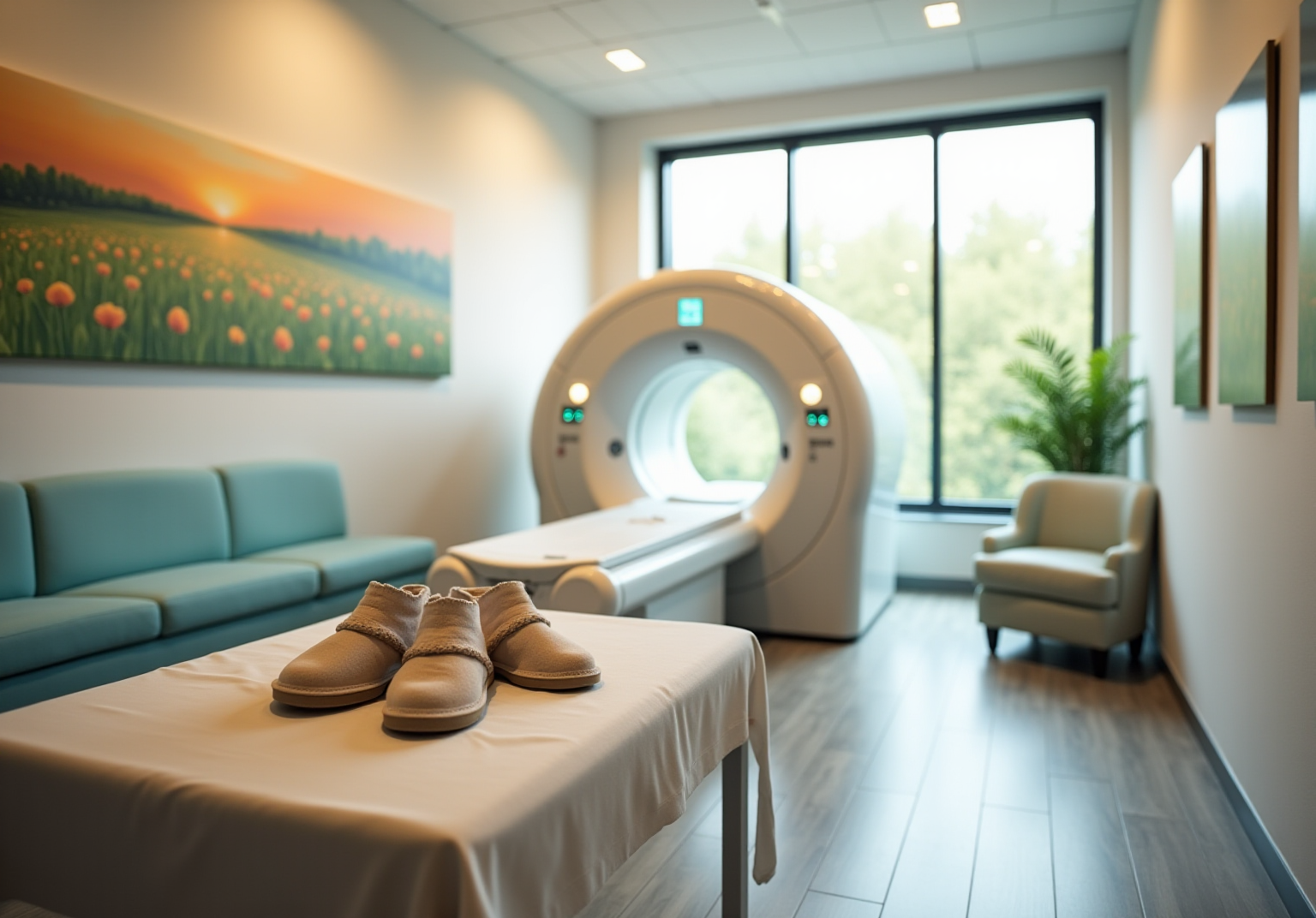


Understanding your heart health is essential, especially as we age. The article highlights the importance of calcium scans in assessing cardiovascular health, particularly in Miami. These scans play a crucial role in the early detection of heart disease, which can be a source of concern for many.
Calcium scans measure calcified plaque in your coronary arteries. This information is vital because it allows for timely interventions and personalized treatment plans. If you have risk factors such as a family history of heart disease, high cholesterol, or diabetes, these scans can provide peace of mind and a clearer path to better health.
In addition to this, knowing that you have options for monitoring your heart health can be reassuring. Early detection means that you and your healthcare provider can work together to create a plan tailored just for you. This proactive approach is essential in managing your health effectively.
Furthermore, it’s important to remember that you’re not alone in this journey. Many individuals share similar concerns, and seeking help is a strong step towards taking control of your health. If you have questions or need support, don’t hesitate to reach out to your healthcare provider. They are there to help you navigate these important decisions.
Ultimately, prioritizing your heart health through calcium scans can lead to better outcomes and a healthier future. Your well-being matters, and taking these steps shows that you care about yourself and your loved ones.
Calcium scans are becoming an essential tool in managing cardiovascular health, especially in vibrant cities like Miami, where heart disease is a significant concern. These non-invasive imaging tests offer crucial insights into the condition of your coronary arteries, empowering you to take charge of your heart health with informed decisions. But as these scans gain popularity, you might wonder: Who should think about getting a calcium scan, and what do the results really mean for your health?
This article explores ten important facts about calcium scans, highlighting their significance, the process involved, and what the results can imply for your cardiovascular care. Understanding these aspects can help ease any worries you may have and guide you toward making the best choices for your health.
At Amavita Heart and Vascular Health, we understand that concerns about heart health can be daunting. As a leading provider of imaging scans in Miami, we offer advanced diagnostic services, such as a calcium scan near me, which are essential for evaluating cardiovascular health. Under the compassionate guidance of Dr. Pedro Martinez-Clark, a Harvard-trained cardiologist, we blend state-of-the-art technology with a nurturing, patient-centered approach. This commitment ensures that every individual receives a personalized treatment plan tailored to their unique health needs.
In 2025, we’ve seen a significant rise in the number of calcium scans near me conducted in Miami. This increase reflects a growing awareness of the importance of early detection in preventing cardiovascular diseases. These scans, such as a calcium scan near me, provide critical insights into heart health, enabling timely interventions that can lead to successful outcomes. Isn’t it comforting to know that taking this proactive step can make a real difference?
Dr. Martinez-Clark emphasizes the vital role of scoring in cardiovascular care, including the benefits of a calcium scan near me. He believes it’s a crucial tool for identifying potential risks before they escalate into serious conditions. Our dedication to innovation and excellence in care makes Amavita a trusted choice for those seeking reliable and effective scoring services in the region.
If you or a loved one have concerns about heart health, we invite you to reach out. Our team is here to support you every step of the way, ensuring you feel valued and cared for. Together, we can navigate your health journey with confidence.
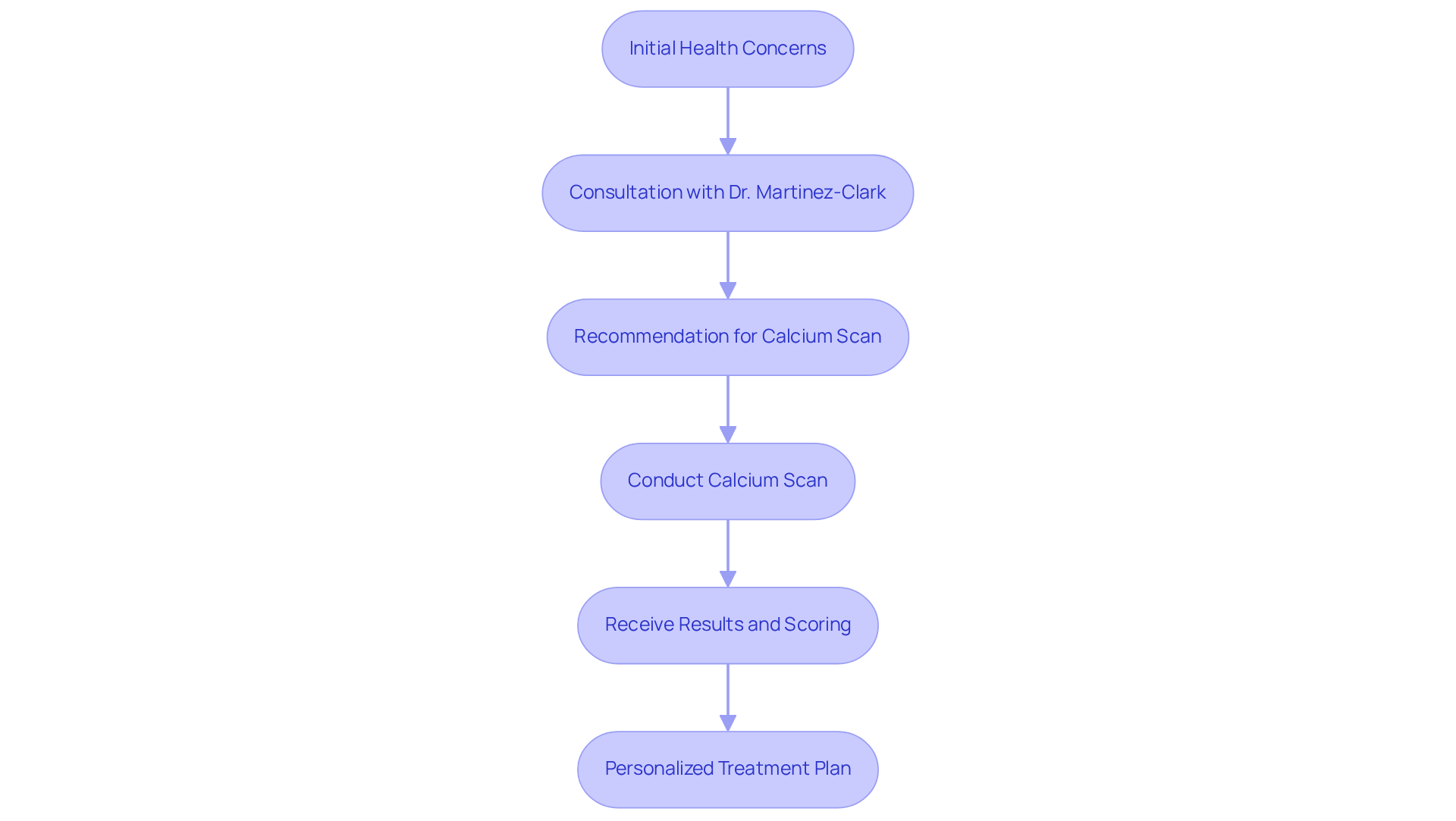
The test for coronary artery calcification, often called CAC evaluation, is a vital non-invasive imaging procedure that measures the amount of calcified plaque in your coronary arteries, and you can schedule a calcium scan near me to undergo this test. Understanding a calcium scan near me is crucial for assessing your risk of coronary artery disease (CAD) and potential heart attacks. When calcium levels are elevated, it indicates a significant buildup of atherosclerosis, which can lead to serious cardiovascular events. Knowing your mineral rating is essential; it can guide important preventive actions and treatment options, including scheduling a calcium scan near me.
At Amavita Heart and Vascular Health®, we truly care about your heart health. We emphasize the importance of thorough cardiac evaluations, ensuring precise diagnoses without delay. Our advanced imaging and testing are all available in one convenient location. For individuals with risk factors like family history, high cholesterol, or diabetes, understanding your mineral levels, such as those revealed by a calcium scan near me, can be life-changing. For instance, one patient with a zero calcium score still faced considerable arterial disease that required stenting. This highlights that a low reading doesn’t always mean you’re in the clear. Comprehensive testing, including coronary CT angiograms, is essential for accurately visualizing your arterial health.
Dr. Khaled Khalaf emphasizes that if you have risk factors or symptoms, it is crucial to prioritize a calcium scan near me for screening and testing. He points out that lifestyle changes—like quitting smoking and adopting a healthier diet—are vital for those who discover plaque buildup through their calcium score test. This proactive approach can significantly reduce the risk of cardiac incidents and enhance your overall cardiovascular well-being.
Moreover, cardiovascular disease incurs around $255 million annually in healthcare costs and lost productivity due to mortality, underscoring the broader impact of this condition on skilled nursing facilities. In summary, the mineral assessment test is not just a number; it’s a critical measure that can influence treatment strategies and lifestyle changes, ultimately guiding you toward better cardiovascular health. Remember, you’re not alone in this journey; we’re here to support you every step of the way.
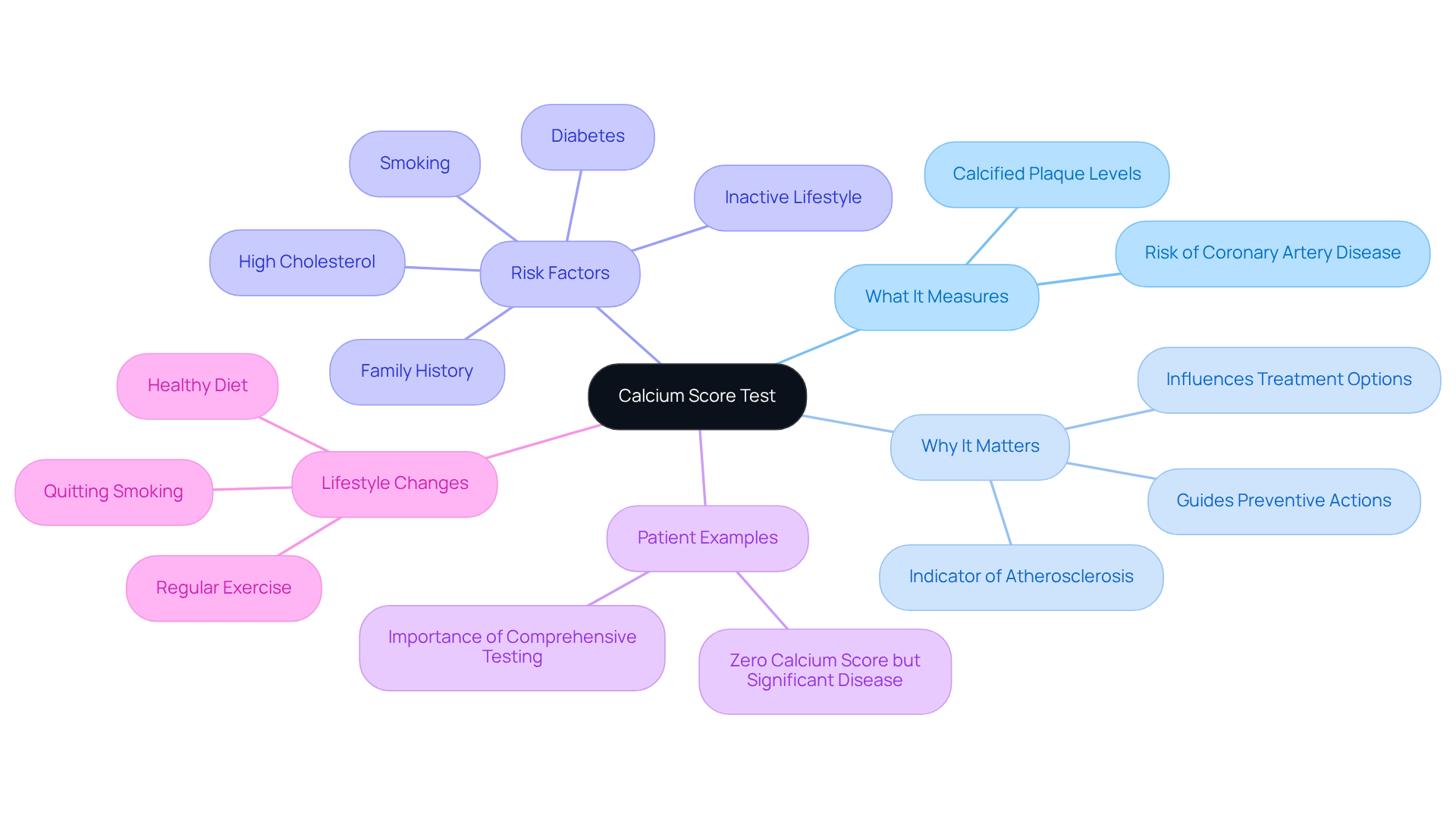
If you're between 40 and 70 and have certain risk factors, it’s important to think about getting a calcium scan near me. These risk factors include:
If you’re experiencing any signs of heart disease or fall into the intermediate category based on standard evaluations, this test could be especially beneficial for you.
Early detection through a calcium scan near me can be a game-changer for those at high risk, allowing for timely interventions that can greatly improve health outcomes. Cardiologists at Amavita emphasize that understanding your calcium levels can guide you toward preventive measures. This might include:
All of which can help lower the risk of serious heart problems.
In Miami, where heart disease is a major health concern, being aware of these risk factors is crucial. Many people are affected by conditions like high blood pressure and diabetes. A calcium score of zero is ideal, while scores are categorized as:
Reflecting varying levels of plaque buildup.
By prioritizing a calcium scan near me and utilizing advanced imaging techniques, you can proactively safeguard your heart health. Remember, personalized care tailored to your unique situation and lifestyle can make all the difference. You’re not alone in this journey; support is available to help you navigate your health concerns.
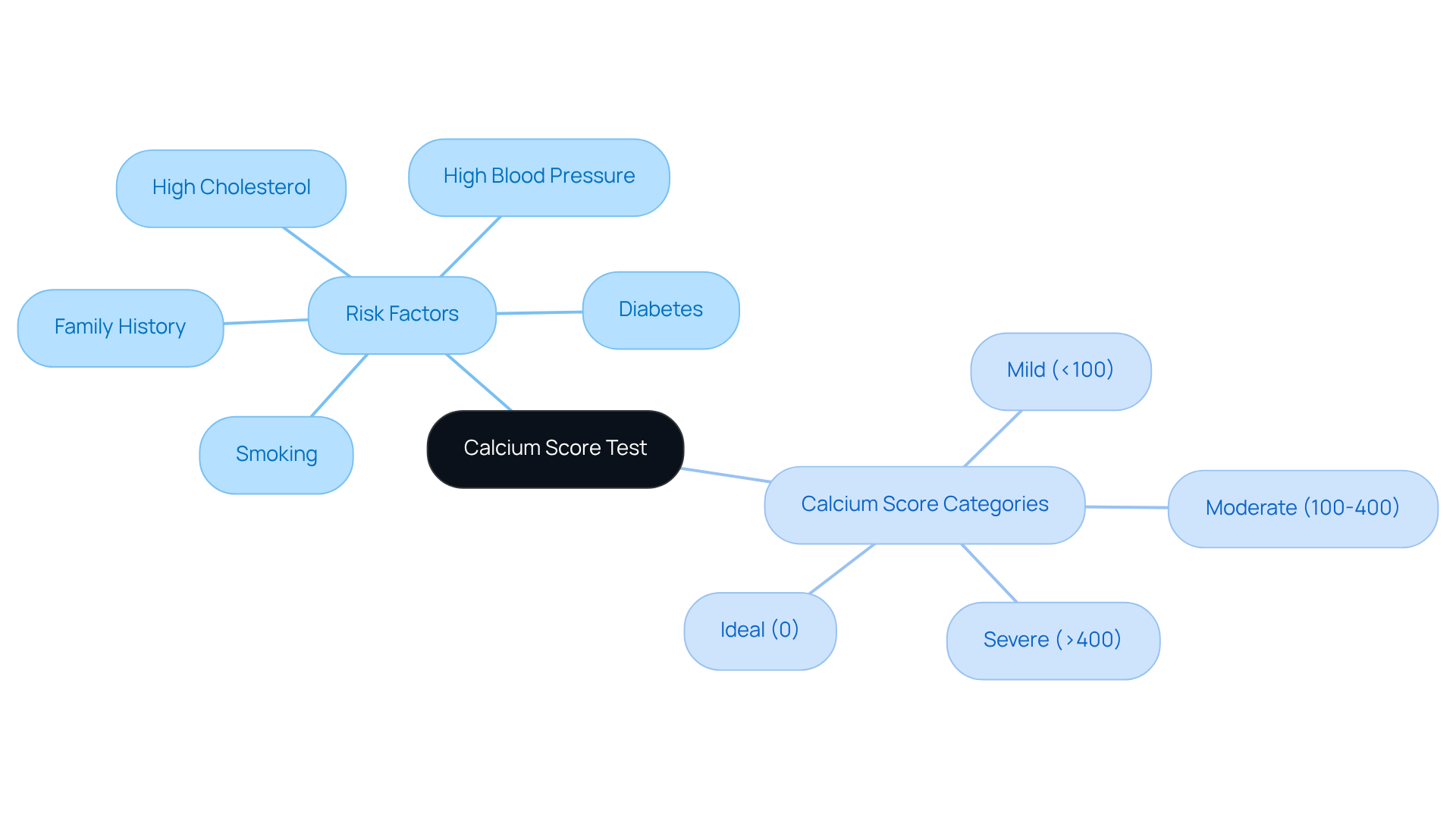
Preparing for your calcium score test can feel a bit daunting, but understanding the steps can help ease your mind. It’s important to refrain from eating, drinking, or consuming caffeine for at least four hours before the test. This preparation is crucial as it helps stabilize your pulse, leading to more accurate results and a clearer picture of your coronary artery health.
In addition to this, wearing loose-fitting clothing and removing any jewelry will ensure you’re comfortable during the scan. After the test, you can return to your normal activities right away, which can help alleviate any worries about how the procedure might affect your daily life. Your results will be carefully examined by a cardiologist, providing you with valuable insights into your cardiovascular health.
However, it’s essential to note that this test isn’t recommended for individuals who have had a cardiac event, received a stent, or undergone coronary artery bypass graft surgery. Also, keep in mind that most insurance carriers do not cover the cost of the test.
As a final suggestion, it’s highly encouraged to consult with your healthcare provider about the best cardiovascular tests tailored to your individual needs. Remember, you’re not alone in this journey; support is always available to help you navigate your health concerns.

At Amavita Heart and Vascular Health, we understand that health concerns can be daunting. During a calcium scan near me, you’ll lie comfortably on a table that glides into a CT scanner, ensuring a smooth experience. Small electrode patches will be placed on your chest to monitor your heart’s activity, ensuring that we capture precise readings throughout the procedure. To help us achieve the best results, we kindly ask that you avoid food, drink, caffeine, and tobacco for four hours before your test.
The entire process is quick, typically lasting about 10 to 15 minutes, with the actual scan taking just a few minutes. You’ll be asked to hold your breath briefly for about 10 to 20 seconds while we capture the images. Rest assured, this procedure is entirely painless and non-invasive—no needles or injections are involved. While there is some exposure to radiation, it’s comparable to that of a mammogram, which is a standard procedure.
After your calcium scan near me, you can return to your usual activities without any limitations, making this a convenient choice for evaluating your cardiovascular health. A measurement of zero is particularly reassuring, indicating a very low chance of a cardiac event in the next two to five years. This offers peace of mind regarding your cardiovascular well-being.
Our advanced imaging capabilities at Amavita are especially beneficial for high-risk patients, ensuring that your cardiovascular care is comprehensive and tailored to your specific needs. We’re here to support you every step of the way, and we encourage you to reach out if you have any questions or concerns about your health.

Understanding your calcium assessment outcomes can feel overwhelming, but it’s important to know that these numbers can provide valuable insights into your heart health. A CAC value of zero means there’s no detectable calcium, which significantly lowers your chances of heart disease. In fact, research shows that individuals with a CAC value of zero are three times less likely to experience cardiovascular events compared to those with positive values.
If your results fall between 1 and 10, this suggests minimal plaque presence, indicating a low threat to your heart. However, values above 100 indicate substantial plaque accumulation, which correlates with a higher likelihood of cardiovascular occurrences. For instance, a CAC value between 100 and 400 carries a relative probability of 4.3 for significant cardiovascular events. This highlights the importance of tracking these measurements closely.
It’s crucial for you to understand these values, as they can guide meaningful conversations with your healthcare provider about necessary lifestyle changes or treatment options. Cardiologists often emphasize that a high CAC value can influence decisions regarding statin treatment, especially for those with intermediate risk factors. Have you had a chance to discuss your results with a medical expert? Engaging in these conversations can empower you to take proactive steps in managing your cardiovascular health.
Moreover, integrating advanced evaluation tools and personalized lifestyle changes can significantly enhance your heart health management. Remember, you’re not alone in this journey. There are resources and support available to help you navigate your health decisions, ensuring that your care is tailored to your unique needs and lifestyle.
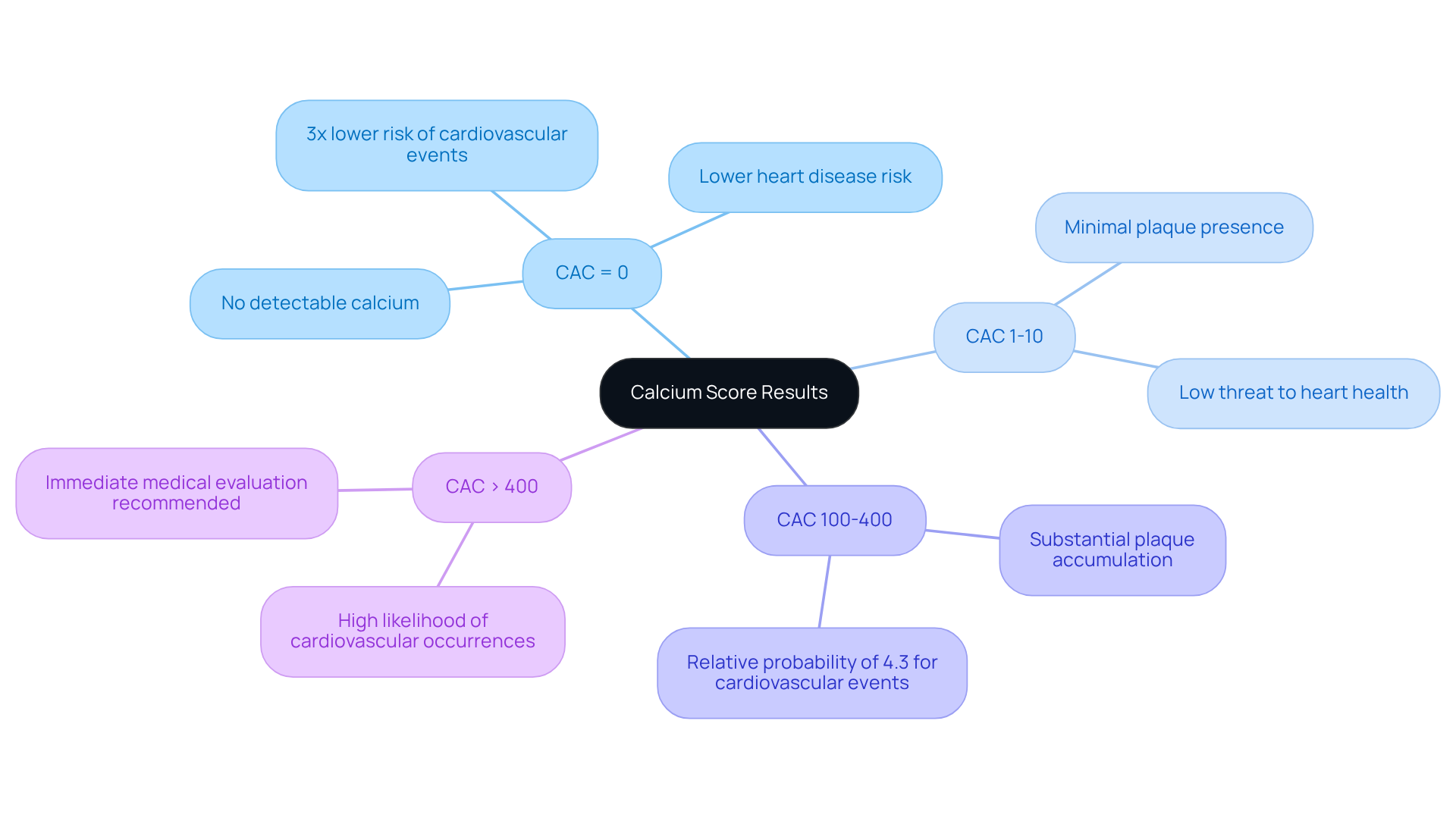
After receiving your results, it’s important to schedule a follow-up appointment with your healthcare provider. This step helps you understand what your findings mean for your health. If your calcium measurement is above zero, it may indicate some level of coronary artery disease (CAD). Higher values can relate to an increased risk of a heart attack. For example, a score over 400 shows strong evidence of CAD, which may require a more proactive treatment approach.
Depending on your results, your doctor might suggest some lifestyle changes. These could include:
Did you know that even a daily 15-minute walk can significantly reduce inflammation, lower blood pressure, and improve insulin sensitivity? These factors are crucial for maintaining heart health. Additionally, establishing a consistent nighttime routine can enhance your sleep quality, potentially reducing plaque calcification risks by up to 33%.
For those with elevated results, further testing or referrals to specialists might be necessary to create a comprehensive treatment plan. This could involve exploring alternatives to statins. Many individuals have successfully stabilized or improved their CAC levels through lifestyle changes rather than relying solely on medication. Engaging in resistance training has also been shown to lower mortality risk by 15% and cardiovascular disease risk by 17%. This highlights the importance of a holistic approach to your cardiovascular health.
Ultimately, a calcium scan near me can help in understanding your calcium level, which is a vital step in managing your heart health. Working closely with your healthcare provider to develop a personalized plan based on your results can lead to effective interventions and better outcomes. Remember, you’re not alone in this journey; support is available to help you every step of the way.

Calcium score tests are generally safe, but it’s important to know they do involve a small amount of radiation, similar to what you’d get from a standard chest X-ray. This level of exposure is usually considered acceptable, especially when you think about the potential benefits of catching coronary artery disease early. If you have any concerns, especially if you’ve had multiple imaging tests before, it’s a good idea to talk with your healthcare provider.
At Amavita Heart and Vascular Health®, we take a comprehensive approach to cardiac evaluations, particularly for those at high risk due to factors like diabetes, hypertension, or a family history of heart disease. Our preventive cardiology strategies combine advanced imaging and testing with personalized interventions, ensuring you receive care tailored to your unique conditions and lifestyle.
However, some individuals may not be the best candidates for this test, such as those with severe obesity or pregnant women, due to the challenges these conditions can create during imaging. It’s crucial for you to understand these risks so you can make informed choices about your cardiovascular health.
Healthcare professionals stress the importance of weighing the pros and cons of calcium scoring. For instance, a study pointed out that while the radiation from a bone scan is similar to that of a mammogram, the chance of detecting significant heart disease early can outweigh these concerns. Many patients express worries about radiation exposure, which often leads to important conversations with healthcare providers about the necessity and timing of these tests.
Ultimately, understanding the safety profile of scoring procedures is vital for anyone considering a calcium scan near me as part of their cardiovascular health evaluation. Additionally, the cost of a CAC scan is around $100, with an overall estimated cost of about $215 when factoring in physician review and incidental findings. At Amavita, we are dedicated to providing personalized cardiac care that prioritizes your health and well-being. If you have questions or need support, please don’t hesitate to reach out.

At Amavita Heart and Vascular Health®, we understand that each patient's health journey is unique. That's why we customize the frequency of calcium scans near me based on personal health factors and initial results. If your rating is zero, you can typically rest easy knowing that retesting every five years is usually sufficient. However, if your calcium scan near me indicates an elevated rating or if there are additional influencing factors, more frequent evaluations may be necessary—possibly every one to three years.
It's essential to engage in open discussions with your healthcare provider to establish a testing schedule that aligns with your specific health profile. For example:
This personalized approach, supported by advanced imaging and comprehensive evaluations, ensures that monitoring is both effective and relevant.
We want you to feel confident and supported in your health decisions. Remember, timely interventions can make a significant difference, and we’re here to help you every step of the way. Don't hesitate to reach out to your healthcare provider to discuss your testing schedule and any concerns you may have. Your health is our priority, and together, we can navigate this journey.

Calcium scans near me are vital for managing cardiovascular health, providing essential insights into coronary artery disease, often before symptoms appear. These scans detect calcified plaque in the coronary arteries, allowing healthcare providers to implement preventive strategies that can significantly lower the risk of heart attacks and strokes. Research indicates that measuring coronary artery mineral levels is more effective than traditional evaluations, enhancing our ability to predict cardiovascular disease, particularly in middle-aged individuals. For instance, a study found that participants with a score of 400 or higher faced a 6.8% risk of cardiovascular events, underscoring the importance of early detection.
Including mineral level scans in a comprehensive cardiovascular health plan empowers patients to take charge of their heart health. By understanding their mineral levels, individuals can make informed decisions about lifestyle changes and treatment options. Many patients have seen positive outcomes linked to early detection through these scans, often experiencing improved health after adjusting their treatment plans based on their results. For example, those with elevated scores are frequently advised to begin daily aspirin therapy and manage cholesterol levels, which can help prevent future complications.
Current trends in cardiovascular health management increasingly highlight the role of calcium scans near me as a preventive measure. As healthcare professionals recognize the significance of a calcium scan near me, these scans are becoming a standard part of routine evaluations for individuals with risk factors, such as a family history of heart disease or high cholesterol. This proactive approach not only aids in early detection but also nurtures a culture of awareness and prevention in cardiovascular health.
Are you feeling uncertain about your heart health? Remember, you’re not alone. By taking these steps and understanding your risks, you can make informed choices that lead to a healthier future. Don't hesitate to reach out for support; your heart health matters.
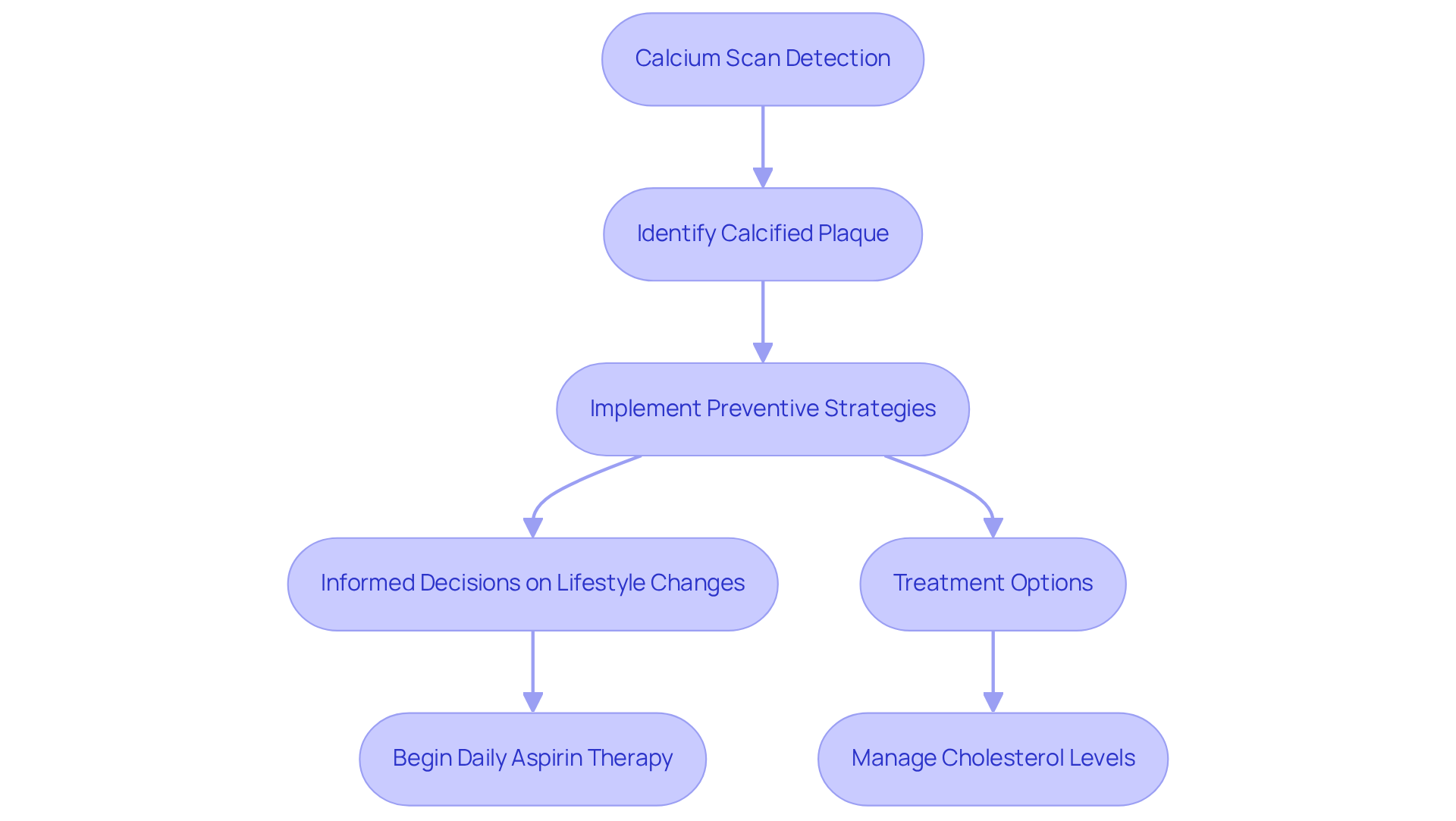
Calcium scans are a vital resource for assessing cardiovascular health, especially for those in Miami who might be at risk for heart disease. These scans offer essential insights into the presence of calcified plaque in the coronary arteries, allowing for early detection and intervention that can greatly enhance health outcomes. As awareness of these scans grows, it reflects a caring approach to heart health, encouraging individuals to seek timely evaluations and personalized care.
Throughout this article, we've highlighted key insights, such as the importance of understanding calcium scores, who should consider these tests, and the necessary steps for preparing and interpreting results. With the support of experienced professionals at Amavita Heart and Vascular Health, you can navigate your health journey with confidence, ensuring you receive tailored care based on your unique risk factors and health profile.
Ultimately, the significance of calcium scans cannot be overstated. They empower you to take charge of your cardiovascular health through informed decision-making and proactive lifestyle changes. By recognizing potential risks and engaging in regular screenings, you can significantly reduce your chances of serious heart complications. Taking the first step towards better heart health begins with understanding and utilizing the resources available—so why not make that call today to prioritize your heart health? You deserve to feel supported and cared for on this journey.
What is a calcium scan and why is it important?
A calcium scan, also known as a coronary artery calcification (CAC) evaluation, is a non-invasive imaging procedure that measures the amount of calcified plaque in the coronary arteries. It is crucial for assessing the risk of coronary artery disease (CAD) and potential heart attacks, as elevated calcium levels indicate significant atherosclerosis buildup.
Who should consider getting a calcium score test?
Individuals between the ages of 40 and 70 with risk factors such as a family history of heart issues, high cholesterol, high blood pressure, diabetes, or a history of smoking should consider getting a calcium score test. It is particularly beneficial for those experiencing signs of heart disease or who are categorized as intermediate risk.
What are the categories of calcium scores and what do they indicate?
Calcium scores are categorized as follows: Ideal: 0 (no plaque), Mild: less than 100 (low plaque buildup), Moderate: 100-400 (moderate plaque buildup), Severe: greater than 400 (high plaque buildup). These scores reflect varying levels of plaque buildup in the arteries, which can guide treatment and preventive measures.
How can the results of a calcium scan influence treatment options?
The results of a calcium scan can guide important preventive actions and treatment options, such as lifestyle changes, starting a daily aspirin regimen, or managing cholesterol levels. Understanding one's calcium levels can significantly influence strategies to lower the risk of serious heart problems.
What role does Dr. Pedro Martinez-Clark play at Amavita Heart and Vascular Health?
Dr. Pedro Martinez-Clark is a Harvard-trained cardiologist at Amavita Heart and Vascular Health. He emphasizes the importance of calcium scans for identifying potential cardiovascular risks and ensures that patients receive personalized treatment plans tailored to their unique health needs.
What is the significance of early detection in cardiovascular health?
Early detection through calcium scans can be a game-changer for individuals at high risk of cardiovascular diseases. It allows for timely interventions that can greatly improve health outcomes and reduce the risk of serious heart problems.
How does Amavita Heart and Vascular Health support patients in their heart health journey?
Amavita Heart and Vascular Health provides advanced diagnostic services, including calcium scans, and emphasizes a patient-centered approach. Their team offers support throughout the health journey, ensuring that patients feel valued and cared for.